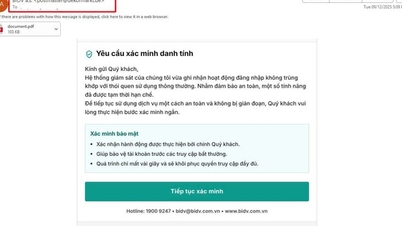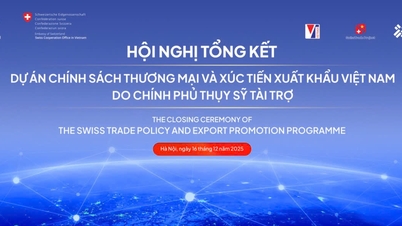 |
With increasingly expanding investment portfolios, banks are becoming more highly diversified.
Amidst the State Bank of Vietnam's (SBV) research into establishing a gold exchange, Techcombank recently announced a recruitment drive for a Senior Gold Trader position. Prior to this, the bank's leadership also stated they were preparing to seek partners, personnel, warehousing, and infrastructure to enter the gold market.
According to Techcombank's leadership, the bank and Techcombank Securities Company (TCBS) have sufficient capacity to coordinate the deployment and operation of a centralized gold trading platform thanks to their extensive experience in building and operating trading centers; strong financial and banking technology and infrastructure; and capabilities in managing product positions and coordinating commodity offerings.
Also wanting to participate in the gold market,ACB stated that it has experience establishing the ACB Gold Trading Center in the past and was also a member of the Dubai Gold & Commodities Exchange in 2009. Accordingly, ACB proposed that, in addition to physical gold trading, there should be an investment option through ETF (Gold ETF) certificates to attract and convert physical gold into cash.
According to the State Bank of Vietnam's roadmap, the pilot project to establish a gold exchange in Vietnam will be divided into three phases. Phase 1 will focus on the physical gold trading exchange, while subsequent phases will add derivative products.
However, according to Mr. Bui Hoang Hai, Vice Chairman of the State Securities Commission, current legal frameworks allow Vietnam to immediately launch two products: gold derivatives and gold exchange-traded funds (ETFs). Gold derivatives help businesses hedge against price fluctuations and meet legitimate speculative needs, while gold ETFs aim to serve the needs of individuals for safe-haven assets.
Currently, eight banks are eligible for licenses to produce gold bars: Vietcombank, VPBank, BIDV, MB, VietinBank, Agribank , Techcombank, and ACB. The group of state-owned commercial banks (BIDV, Vietcombank, VietinBank, and Agribank) have not yet commented on their strategy for entering the gold market, but all four banks have made several proposals related to gold import, production, and trading activities.
BIDV also suggested that the State Bank of Vietnam issue guidelines on allowing the buying and selling of gold accounts abroad to balance its position.
Beyond the gold market, banks are also actively participating in the race to establish cryptocurrency exchanges. As of the end of September 2025, a number of banks had appeared in joint-stock companies offering cryptocurrency exchanges, including LPBank (LPEX), HDBank (HDEX), VPBank (CAEX), Techcombank (TCEX), and MB (which signed a memorandum of understanding for technical cooperation with Dunamu - the operator of Upbit, the largest cryptocurrency platform in South Korea).
If gold and cryptocurrency exchanges are established, many banks will significantly increase their revenue from these two asset investment channels. In other words, banks that gain entry into the gold and cryptocurrency market will have an advantage in diversifying their ecosystem, attracting and retaining customers, increasing capital, and boosting revenue and profits.
Smaller banks are finding it increasingly difficult to compete.
Not only are smaller banks facing intense competition in the service sector, where their ecosystems struggle to compete with larger banks, but even in traditional areas like lending and deposit mobilization, they are increasingly finding it difficult.
According to FiinRatings, large banks are currently benefiting from more stable deposit sources and better access to the bond market, while also benefiting from reduced mandatory provisions, which increases liquidity and lowers funding costs.
Meanwhile, smaller commercial banks face fierce competition in deposit mobilization and higher wholesale costs of capital, forcing them to extend the maturity of their funding sources and tightly manage their asset-liability balance sheets to comply with the 30% ceiling on short-term capital used for medium and long-term lending, while maintaining reasonable profit margins.
Statistics from FiinRatings show that the credit ratings of banks in the first half of this year reflect an increasingly clear divergence in the quality of their credit. Banks with strong capital capacity continue to consolidate their position, while banks with limited capital capacity and weak fundraising capabilities face pressure for declining credit quality.
Forecasts indicate that the divergence will become increasingly pronounced in the 2025-2026 period if macroeconomic conditions worsen. Smaller banks with low Tier 1 capital, high non-performing loans, weak coverage ratios, and heavy reliance on interbank funding will face risks of deteriorating asset quality and higher provisioning requirements. Currently, the non-performing loan coverage ratio of smaller banks is very low, reflecting a weaker buffer against credit shocks in the private sector.
From the end of 2025, Basel III capital requirements and the removal of credit limits will create an increasingly clear differentiation among banks. Specifically, banks with large capital sizes and capacities will expand their market share, while smaller banks will need to regulate growth to balance capital, profitability, and asset quality.
Meanwhile, VIS Rating analysts also warned of strong divergence within the banking sector. Accordingly, many smaller banks will face significant pressure due to high credit costs, leading to eroded profits and reduced competitiveness.
“Liquidity remains a prominent challenge, especially for smaller banks. While large banks maintain balance through issuing long-term bonds and accessing foreign capital, smaller banks, with their limited liquid assets and heavy reliance on short-term sources, are under significant pressure from funding costs. If unexpected fluctuations in deposit flows occur, the liquidity risk for this group will increase significantly,” the analyst warned.
Experts warn that the trend of divergence in bank profits will become increasingly pronounced. Smaller banks, if they do not restructure their deposit models and improve risk management in time, will face increasing pressure.
Source: https://baodautu.vn/ngan-hang-nho-ngay-cang-kho-canh-tranh-d415534.html






![[Photo] Prime Minister Pham Minh Chinh attends the Conference summarizing and implementing tasks of the judicial sector.](/_next/image?url=https%3A%2F%2Fvphoto.vietnam.vn%2Fthumb%2F1200x675%2Fvietnam%2Fresource%2FIMAGE%2F2025%2F12%2F13%2F1765616082148_dsc-5565-jpg.webp&w=3840&q=75)













































































































Comment (0)